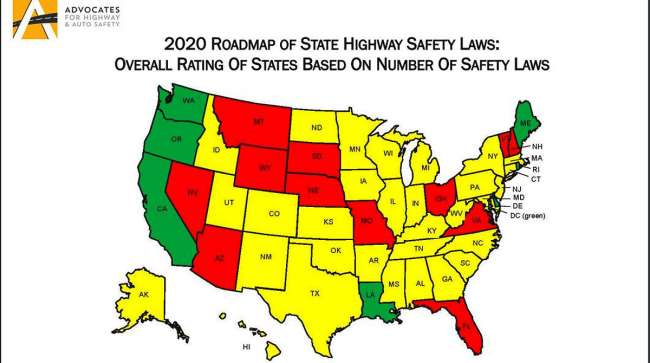Staff Reporter
Advocates Ranks Best, Worst States for Enacting Highway Safety Laws

[Stay on top of transportation news: Get TTNews in your inbox.]
For the fourth year in a row, Rhode Island has topped Advocates for Highway and Auto Safety’s list evaluating states’ road safety enforcement efforts.
Advocates, as the group is known, released its 2020 Roadmap of State Highway Safety Laws on Jan. 23. Advocates is a consortium of consumer, public health, safety and insurance firms that supports policies and programs designed to promote highway safety.
During a media event to unveil the report, Advocates President Cathy Chase said about 100 people are killed in crashes every day on the nation’s roadways. In addition to emotional devastation, motor vehicle crashes impose an annual economic burden of $242 billion.
Advocates for Highway and A... by Transport Topics on Scribd
“With the start of a new decade, our clear vision is to eradicate the horrific death and injury toll occurring on our roadways,” Chase said.
Advocates’ report identifies the states that perform best and worst in terms of enforcing highway laws. It ranks all 50 states and the District of Columbia on adoption of 16 traffic safety laws that the group has identified as essential to road safety, including those addressing distracted and impaired driving, motorcycle helmets and seat belts.

Cathy Chase by Advocates for Highway and Auto Safety
Rhode Island, having enacted 13 of the recommended safety laws, received the top score. The state lacks only an all-rider motorcycle helmet law, nighttime restrictions to limit unsupervised teen driving from 10 p.m. to 5 a.m. and regulations on the age limit for unrestricted license use. An unrestricted license allows teens to drive without the supervision of a guardian or instructor. Advocates urges for unrestricted licenses to be granted no sooner than age 18.
Delaware, Maine, Oregon, Washington, California, the District of Columbia and Louisiana also were significantly advanced in their law enforcement and received a “green” rating.
South Dakota, Wyoming, Arizona, Missouri, Montana, Florida, Ohio, Nebraska, Nevada, New Hampshire, Vermont and Virginia ranked among the lowest and earned a “red” rating. South Dakota, which repeated as the state with the poorest score, has enacted only two of the laws promoted by Advocates.
“The 16 optimal laws are precisely the types of recommendations nurses endorse to help prevent crashes and fatalities from happening or to reduce their severity,” said Mary Jagim, former president of the Emergency Nurses Association. “The goal of this rating is not to shame those states but rather to serve as a clarion call to action.”
Thank you Lee Fanshaw, Mary Jagim, Cmdr. Chris Olson, Dr. Deanna Wathington & Jennifer Weaver for participating in the @SafeRoadsNow 2020 Roadmap Press Conference. https://t.co/z23ORVIcpY pic.twitter.com/goCjUwYovu — Advocates (@SafeRoadsNow) January 23, 2020
Advocates also unveiled the results of its recent public opinion survey on distracted driving and marijuana-impaired driving. Some 90% of survey respondents agreed that states should pass laws prohibiting distracted activities, such as watching movies or playing video games, while driving. Some 76% of respondents expressed concern about marijuana-impaired driving.
In 2019, 12 laws were passed in nine states and the District of Columbia that meet the criteria for the basic safety laws Advocates outlines in the report. New Jersey required ignition interlock devices for all impaired driving offenders. Arizona enacted a primary enforcement all-driver texting ban. Primary enforcement means an officer can pull a person over if they are not complying with that law.
No state has instituted all 16 of Advocates’ recommended laws.
“As legislative sessions are getting underway across the country, closing these safety gaps must be a top priority,” said Lee Fanshaw, federal government affairs director at American Family Insurance. “Our purpose today is to bring these issues to their attention.”
Want more news? Listen to today's daily briefing:




